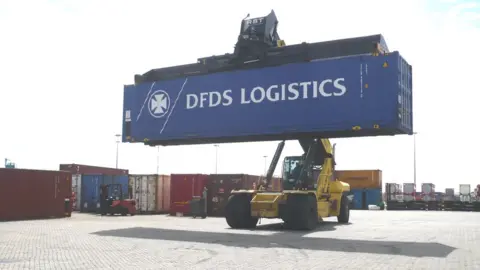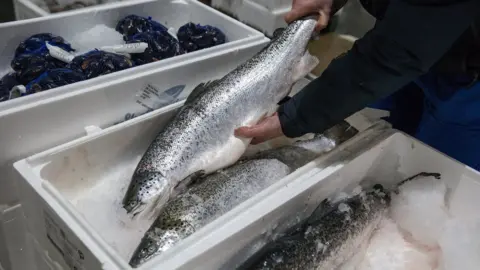Seafood bodies call for 'lighter touch' on exports
 DFDS
DFDSScotland's main seafood and food trade bodies have called on the UK government to help resolve delays to EU exports.
Scotland Food and Drink, the Scottish Salmon Producers Organisation and Seafood Scotland urged a "lighter touch" approach to the issue.
Their appeal came as seafood logistics firm DFDS said it was tackling a backlog of fresh fish in Scotland.
The government said it was working with the seafood industry "to help understand and address the issues".
Firms in a number of sectors have been raising concerns about the impact of the new Brexit trading rules, which came into effect last week.
In a joint statement, the Scottish trade bodies said they wanted the UK government to work with French authorities to ensure a "light-touch" approach to paperwork "until everything settles down".
They also called on both the UK and Scottish governments to liaise closely with hauliers, local authorities and the agencies dealing with the new paperwork to ensure adequate resources are in place.
Fresh fish 'backlog'
On Thursday, seafood exporter DFDS Logistics Scotland temporarily halted export groupage - truckloads combining multiple small consignments - after hitting problems.
It cited paperwork and IT issues for the move.
DFDS said it would be working over the weekend to bring down the backlog.
The company's comments came as seafood exporters said they had been hit by a "perfect storm" of bureaucracy, IT problems and confusion following new border rules introduced last week.
 EPA
EPAA government spokesman acknowledged that there had been "some issues", but said ministers had always been clear there would be some disruption at the end of the transition period.
A spokeswoman for DFDS said the backlog of fresh fish started earlier this week because of a delay in obtaining the right health certificates for transporting the fresh goods into Europe.
'Extra resources'
She said: "Over the days, the backlog has increased as we experience some difficulties in the interface between DFDS' and the authorities' IT Systems and because customs documentations too often lack the quality needed to be accepted in the systems.
"We have put extra resources in place to fix the IT issues and have at all times been ready to support our customers getting their documentations right before entering the ports or Eurotunnel."
She added: "Over the weekend, we will work to bring down the backlog and today, Friday afternoon, we see goods starting to move slowly again as some of the issues are being resolved.
"At the moment we can't say when we expect to be fully back to normality."
The Scottish government's Europe and External Affairs Secretary, Michael Russell, said the problems were "exactly the sorts of issues" they had warned their UK counterparts about as the Brexit transition period ended.
He said: "The Scottish government is doing its utmost to advise and work with Scottish businesses on the variety of compliance paperwork and procedures that now apply."
'Working closely'
A UK government spokesman said it was working closely with the seafood industry "to help understand and address the issues they are experiencing".
He said: "We are contacting exporters, their representatives and transporters to help them understand the requirements to keep their goods moving. It is vital that exporters check they have entered in details correctly and ensure that they have provided the transporter of the goods with the correct documentation.
"We urge the Scottish government to ensure they have appropriate staffing levels in place at hubs in their area to certify documentation and ensure there are no delays to food exports.
"We have given the Scottish government nearly £200m to prepare for leaving the EU, to minimise disruption and guarantee business readiness."
